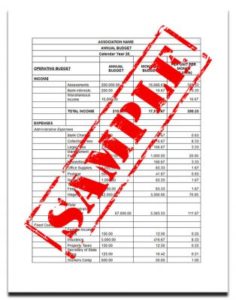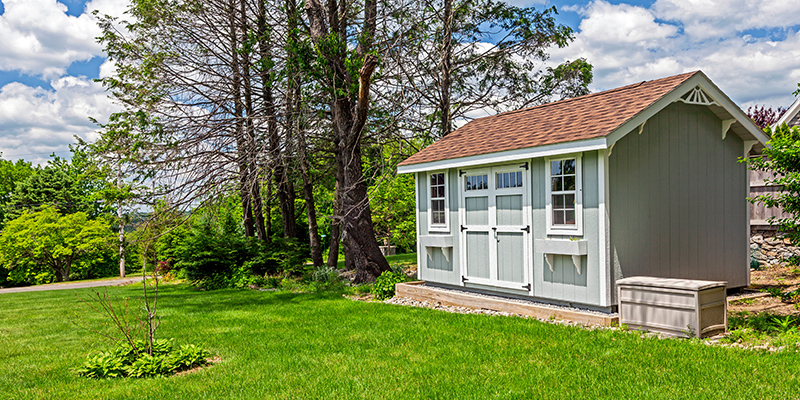How To Plan For Your HOA Budget

The annual budget is a cornerstone of every homeowners association. Yet, HOA budget planning is a task many HOA boards find daunting because it takes a lot of work. Simplify the process by following a few easy steps.
Browse By Category
Sign up for Our Newsletter
The annual budget is a cornerstone of every homeowners association. Yet, HOA budget planning is a task many HOA boards find daunting because it takes a lot of work. Simplify the process by following a few easy steps.
What Is an HOA Budget?
A homeowners association budget is a financial plan consisting of the HOA’s estimated revenue and expenses, as well as reserve fund contributions, for a specific period of time (usually a year).
Usually, your manager will work with the treasurer to prepare a draft budget. Another idea is to create a budget committee, which comprises members of the community association, enabling residents to voice their opinions on how their money is spent. This not only spreads the workload but promotes greater understanding by residents and acceptance of the fees and necessary increases.
What Is the Purpose of a Budget for HOAs?
The HOA budget is a valuable instrument for any homeowners association. It acts as a guide of sorts, steering the board to make the right financial decisions.
A budget also helps you plan for the coming year’s expenses, allowing you to manage the association’s expenditures carefully. This includes maintenance, utility, insurance, and management fees. Additionally, the HOA budget helps the association maintain a reserve fund, which contains the funds necessary for the cost of major replacements and repairs.
Finally, the HOA budget is a critical aid in determining homeowner dues, which is the association’s primary source of income. Without projected expenses, your board would have no way of knowing how much to charge homeowners in dues. This, in turn, makes you vulnerable to imposing higher special assessments.
HOA Budget Planning the Right Way
The annual budget is an important management tool and the HOA budget preparation process provides an opportunity for additional analysis to be made, planning to be done, and a review of the association’s goals and priorities. Some of the steps that are part of budget preparation are:
1. Make a Business Plan
How do I make an HOA budget? When you plan HOA budgets, the first thing you should do is lay out your objectives. What is it that your association hopes to achieve in the upcoming year? Break down your annual goals by month to make the process easier.
2. Look at Past Budgets
 During the HOA budget meeting, it would help to review your annual budgets for the previous years’.
During the HOA budget meeting, it would help to review your annual budgets for the previous years’.
Looking at past projections and how they compared to the actual expenses will allow you to identify any trends.
For instance, you may discover that your actual maintenance costs always end up being higher than your projections. This means that your HOA has consistently been under-budgeting for maintenance. With this insight, you can make more accurate maintenance cost projections for this year.
3. Send Requests for Proposals
HOA budget planning involves a lot of projections, but it is much better to get accurate numbers. To do this, take a look at your current vendor contracts and see which ones are up for renewal. Then, send out requests for proposals (RFPs) early to see how much vendors intend to charge you for their services.
4. Evaluate Maintenance and Utility Costs
Your budget should also include projected maintenance and utility expenses. This includes water, electricity, gas, and the like. Check the previous year’s actual maintenance and utility costs to gauge your expenses for the coming year. It will also help to account for inflation or any wage increases, as these factors can indirectly affect maintenance and utility costs.
5. Update Insurance
Your association should already have comprehensive insurance policies. But, if it does not, or if you feel like you lack essential coverage, then you should take a look at your available options. Contact your insurance provider for an in-depth discussion of the insurance premiums and what they cover.
6. Account for the Reserves
One of the HOA budget best practices is to always consider your association’s reserves. Your reserve fund is there to cover future replacements and repairs. Therefore, it should always stay at an optimal level.
How much money should an HOA have in reserves? Analyze your reserve fund by conducting a study and make sure to allocate a portion of the budget for the reserves. This way, you can cover future capital expenses. A good general rule is to maintain at least a 70-percent funded reserve fund at all times.
7. Review Financial Statements
Your balance sheet and income statement paint a picture of your association’s current financial health. Analyze these financial reports to determine whether or not you need to make adjustments to your budget this year. Perhaps you are spending more money than you are earning. In that case, you should prepare your budget accordingly.
8. Compute
After gathering information and getting all the numbers, it is time to plug them all in. Use an HOA budgeting software or a simple Excel spreadsheet.
Compute your total projected expenses and compare the total against the revenue you expect to receive from sources other than HOA dues. From there, you can calculate how much to charge each homeowner for their dues.
9. Get Approval
 The budget approval process also involves setting up a meeting for the purpose of ratifying the budget.
The budget approval process also involves setting up a meeting for the purpose of ratifying the budget.
What does it mean to ratify a budget? Simply put, budget ratification is when you obtain approval for the proposal from the people you are collecting money from — in this case, the homeowners.
Is HOA budget ratification required? It depends on what your governing documents say. Some associations are required by their CC&Rs or bylaws to ratify the budget, as well as whether the vote must come from the board or the homeowners.
In North Carolina, though, HOAs are required by law to ratify the budget. The state’s Planned Community Act mandates that HOAs must provide an opportunity for budget ratification within 30 days following the adoption of any proposed budget.
10. Inform Homeowners
Homeowners have a right to know where their money is going. Therefore, your HOA board must share the approved budget with community members to keep them in the loop. Practicing transparency also helps build trust between the homeowners and the HOA board.
Some states also have laws requiring associations to provide their members with budget reports. For instance, in California, Civil Code Section 5300 states that HOAs must issue an annual budget report within 30 to 90 days prior to the end of the fiscal year. Check your own state laws and governing documents for any similar provisions.
Bonus Tips on How to Prepare HOA Budgets
- Consider any ‘projects’ that have been discussed during the year but were not planned for the current year, for inclusion in HOA budget planning for the coming year: e.g. landscape upgrades, new benches or signs, etc.
- When preparing the draft budget, the preparer will:
- Use year-to-date totals and project the actual totals through the end of the year.
- Compare the annualized totals with the budgeted amount for the current year as well as the previous year’s actual totals to identify trends.
- Investigate any numbers that vary significantly from the budgeted amount to find the reason for the variance and budget accordingly.
- Check with vendors to find out what the expected increases will be in their contracts (grounds, pool, management, termite contract, insurance, utilities, etc.).
- Check the legal documents to find out what rules apply to increases in dues. It is fiscally responsible to increase the dues annually to keep pace with inflation.
- Include notes to explain the changes in line items where relevant.
- Check the reserve study to ensure that budgeted reserve funding is following the recommendation as per the reserve study (long-range planning).
- Include reserve expenses as scheduled per the reserve study.
- Include recommended categories in your proposed budget, such as an association website, Board Education (CAI), a reserve study, or an update to the study.
- Look for an HOA budget template online to serve as a guide.
Additional HOA Budget Guidelines
The goal is always to develop a balanced budget. If the expenses outweigh the revenue, consider ways to lower expenses without sacrificing the quality of service. If that fails to achieve a balanced budget, the only alternative is to raise dues or charge a special assessment. Keep in mind that the association is a Not-For-Profit entity, so your goal is effectively to have a zero income at year-end.
Responsible financial planning is an important fiduciary obligation of the board. The association’s legal documents stipulate the deadlines for dues approval, budget adoption, and homeowner notification. Failure to properly notify homeowners of the new dues could lead to disputes and non-payment of dues.
Advance HOA budget planning and preparation will ensure that the process goes smoothly:
1) Establish a clear timeline – as per the governing documents:
Dues must be set by (date)______________________ Ref:___________________
Dues notice must be sent by: (date)________________ Ref:__________________
Budget must be approved by: (date)____________________ Ref:___________________
Budget to be provided to homeowners by (date)____________ Ref:_________________
Mailed___ Posted on web___ Presented At annual meeting_____
Budget ratification meeting required: yes___ no___ Ref: ____________________
2) Prioritize by allocating adequate time on the meeting agenda for the budget discussion.
3) Contact the manager in advance of the meeting if there are questions about the proposed budget. This way, all pertinent information can be researched and will be available during the budget discussion to enable a timely decision.
Example of an HOA Annual Budget
What does an HOA budget look like? An HOA budget should include the association’s projected revenue, projected expenses, and reserve fund contributions.
To the untrained, preparing a budget can feel like an uphill battle. Luckily, you can easily plug your numbers in with the help of a template. Here is an HOA or condo association budget template you can use as a reference:

Download Your Free Annual HOA Budget Template Here
Budget Planning Is a Serious Undertaking
HOA budget planning is a critical part of managing a community. It takes a good amount of time to gather information and make computations, so make sure to start planning well ahead of time. Aside from acting as a guide for the coming year’s expenses, the budget lets the board know how much to charge residents in dues. Take it seriously.
If you need help drafting and approving your budget, it may be time to consult with an HOA management company. Unfortunately, finding one in your area that both suits your needs and your budget can be difficult. Our online directory makes the search process easier for associations of all sizes.
RELATED ARTICLES:
- How The HOA Board Should Review HOA Finances Properly
- HOA Insurance 101: Why Does Your HOA Need It?
- How To Run An HOA Community With Great Success
Trending Now
Related Article
Sign up for Our Monthly Newsletter
Sign up below for monthly updates on all HOA Resource

















